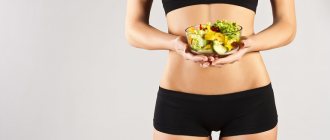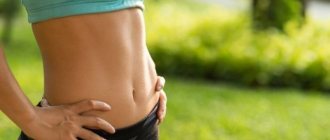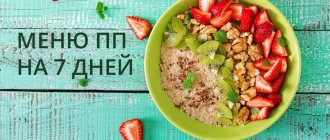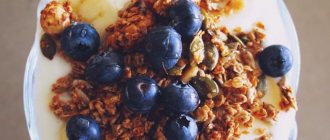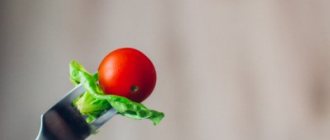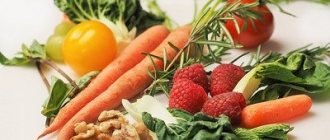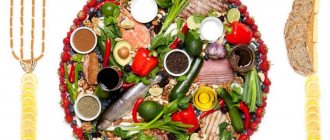Tips to help you eat right
Don't miss breakfast
Skipping meals will not help you lose weight, because it is in the morning that the body must be charged with energy and a full supply of macro- and microelements. Without receiving the required dosage of nutrients, the body will begin to work in “camel” mode, storing any food that enters the body into fat. As a result, skipping breakfast can lead to obesity.
Content:
- Tips to help you eat right
- Diet rules for losing weight for teenagers
- Exceptions and recommendations
- Healthy diet menu
- Contraindications to a healthy diet
Five servings of fruits and vegetables
Fruits and vegetables are good sources of many of the vitamins and minerals that the body needs during adolescence. Aim to eat at least five servings of a variety of fruits and vegetables per day.
Limitation
Reduce your intake of foods and drinks that are high in fat, sugar and salt, such as sweets, candy bars, cakes, cookies, sodas and chips, which are high in calories (energy). Consuming too many calories can lead to weight gain and being overweight.
Water balance
Aim to drink six to eight glasses of fluid per day - water and skim milk.
Even unsweetened fruit juice is not suitable, as it contains fructose and sucrose. The daily dosage of fruit or vegetable juice drinks and cocktails should not exceed 150 ml per day - this is a small glass.
Feeling tired
If in adolescence there is a feeling of fatigue, disturbed sleep (mainly observed in girls), then the body needs iron. It is important to saturate your diet with iron-fortified foods.
Vitamin D
Vitamin D helps maintain healthy bones and teeth. We get most of our vitamin D from the sun, but it is also available in some foods.
Calcium
Calcium helps maintain strong bones and teeth. Good sources of calcium include milk and other dairy products, and leafy green vegetables.
| Food | Serving Size | Amount of calcium (mg) |
| Almond | 50 milliliters | 75 |
| Bok choy, cooked | 125 milliliters | 85 |
| Broccoli, cooked | 125 milliliters | 50 |
| Fresh figs | 6 fruits | 150 |
| Fruit yogurt low fat | 175 milliliters | 215 |
| Fermented yogurt | 175 milliliters | 300 |
| Hard cheese | 50 grams | 360 |
| Fresh skim milk | 250 milliliters | 300 |
| Orange juice | 125 milliliters | 150 |
| Rice | 250 milliliters | 300 |
| Boiled soybeans | 125 milliliters | 90 |
| Boiled beans | 125 milliliters | 100 |
| Boiled or canned salmon | 300 grams | 180 |
| Boiled white fish or canned sardines | 400 grams | 180 |
Passion for diets
Diets that promise quick weight loss are often nutritionally unbalanced, meaning the body will not receive important vitamins and minerals. Diets also have the disadvantage of short-term results. And for teenagers, such stress with sudden changes in weight can negatively affect health and hormonal levels.
Diet rules for losing weight for teenagers
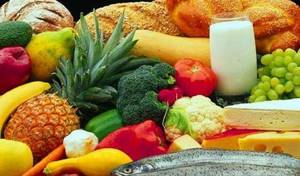
It is worth noting that a healthy diet for teenagers should be prescribed exclusively by a nutritionist. If you develop a healthy diet for weight loss on your own, you can provoke the appearance of irreversible negative processes in the growing body.
There are several very important rules to follow when losing weight for teenagers:
- the diet needs to be cut by twenty percent of the norm (for girls the norm is 2500 kilocalories, and for boys the norm is 2700 kilocalories);
- the diet should contain fifty percent healthy carbohydrates, twenty-five percent fats and proteins;
- four or five meals a day (meals should be taken without skipping and at the same time);
- For breakfast you need to eat carbohydrate and protein foods;
- for lunch you need to eat hot liquid food (first courses);
- for afternoon snacks and dinner you need to eat low-calorie foods: vegetables, boiled meat, fish;
- maximum avoidance of fried and fatty foods;
- presence of physical activity at least three times a week.
If you take into account all these rules, it will be easier to lose weight, and the process will be as effective as possible.
The basis of proper nutrition
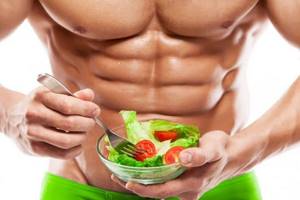
Before drawing up a meal schedule for the week, read the basic rules:
- To develop a habit, it is advisable to have breakfast at the same time.
- Complex carbohydrates are necessarily present in food. It is recommended to take them in the morning. Such food includes various cereals.
- Do not load your stomach during the afternoon snack. Give preference to low-calorie foods.
- One of the important rules is variety, food should have different origins (animal and plant)
- Maximum calorie intake is lunchtime.
- If it so happens that you have fallen off the regime, do not give up under any circumstances, continue to eat healthy food as if nothing had happened.
- Eating frequently will help improve metabolism; the best option is five meals, with a time difference of 3 - 4 hours.
- Do not start lunch in a tired state; you need to eat slowly, putting aside extraneous thoughts.
- After finishing the meal, drinking water or tea is allowed 30 - 40 minutes later.
- Replace sugar and sweets with honey.
- Replace regular salt with iodized salt and reduce its consumption.
- Avoid coffee; you can replace it with chicory.
The benefits of healthy eating
Proper nutrition and a weekly menu for the family will bring the following benefits:
- By eating frequently, the body will stop feeling hungry. The absence of this phenomenon helps to improve metabolism. In case of possible need for food, optimal snacks are provided.
- Despite some tips and rules, a healthy diet does not limit a person’s taste preferences. If you really want a portion of fried shish kebab, a sausage sandwich or pizza, once a week you can treat yourself to “junk” food without compromising your health.
- If you are used to visiting restaurants and are often guests, you can always choose the best meal options for each family member.
Exceptions and recommendations
A healthy diet should exclude the following foods: candy, nutrition bars, soda water, chips, mayonnaise, ketchup, sausage, fast food and sweet baked goods, fried cutlets and fried potatoes. The diet should include whole grain cereals, soups, rye bread, seafood, boiled meat (chicken, pork, beef), and dairy products.
Potatoes are allowed to be consumed twice a week only in boiled or baked form. You can only use high-quality pasta from durum wheat, cooked al dente. If you have intestinal problems, it is recommended to avoid eating legumes or reduce their consumption to a minimum. Under no circumstances should you give up bread; you just need to get into the habit of eating bread in a slightly stale form or in the form of crackers.
It is important to give yourself a fasting day once a week; during this period you can drink low-fat kefir, eat buckwheat cooked in water, and eat apples (green or yellow). A fasting day involves consuming a maximum of 1000 kilocalories per day. It is strictly forbidden to abuse such days.
Healthy diet menu
Consider a healthy diet menu for the week.
Day one: breakfast - two toasts with cheese and butter, one soft-boiled egg, a medium-sized tomato and tea without sugar; second breakfast – an apple and one hundred grams of low-fat cottage cheese; lunch – two hundred grams of spaghetti with vegetable salad; afternoon snack – boiled cauliflower with carrots + a glass of low-fat kefir; dinner – fish baked with herbs and a glass of tomato juice.
Second day: breakfast – three-white omelette, green tea with honey and one piece of toast; lunch – lean borscht, mashed potatoes and steamed cutlet; afternoon snack – any three fruits (bananas and grapes are not allowed); dinner - vegetable salad, Feta cheese and baked chicken breast.
Third day: breakfast - oatmeal with milk, tea with crackers; lunch – pumpkin and carrot puree soup, cottage cheese casserole; afternoon snack - fruit and yogurt; dinner – vegetable salad with tuna and a glass of tomato juice.
Fourth day: breakfast – milk rice porridge and tea without sugar with crackers; lunch – mushroom soup with three baked potatoes and a glass of berry compote; afternoon snack – apple charlotte – one serving, a glass of warmed milk; dinner – vegetable salad with baked fish.
Fifth day: breakfast – oatmeal porridge with water, hard-boiled egg, toast; lunch – a handful of dried fruits; afternoon snack – baked green apple with cottage cheese; dinner - ratatouille.
Best materials of the month
- Coronaviruses: SARS-CoV-2 (COVID-19)
- Antibiotics for the prevention and treatment of COVID-19: how effective are they?
- The most common "office" diseases
- Does vodka kill coronavirus?
- How to stay alive on our roads?
Day six: breakfast – pancakes with green tea; lunch – vegetable soup, pasta with chicken breast; afternoon snack – unsweetened yoghurt with a bun; dinner – salad with crab sticks and avocado.
Seventh day: breakfast – two toasts with cheese and butter, green tea without sugar; lunch – soup with pumpkin, cream and broccoli; afternoon snack - fruit; dinner – vegetable salad and chicken with cheese (baked).
Products that improve the condition of the body
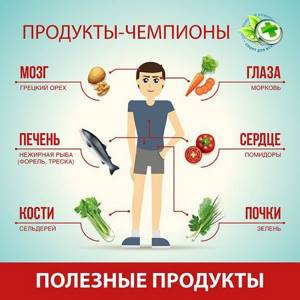
If there are problems with certain body systems, it is recommended not only to undergo courses of therapy and take medications, but also to eat certain foods.
There are foods that support the kidneys, liver, heart, brain and many other parts of the body. Their use in increased quantities is permissible without a doctor’s prescription, but only if all norms of mineral and vitamin balance are taken into account.
The body needs fiber to remove unprocessed waste. If the body lacks this substance, then intoxication begins first in the intestines and then in other parts of the body. Fiber is found in carrots, onions, cabbage and tomatoes. These vegetables can be easily purchased in the northern conditions of our country.
Carrots not only remove toxins from the body, but also supply vitamin A to vision, increase blood flow and thereby help the body and brain function better. Onions and garlic are difficult to consume, but along with their antioxidant effect, they give the body increased immunity. Tomatoes and cabbage reduce the risk of cholesterol and improve vision.
Fruits are necessary for the endocrine system. Bananas and avocados enhance regeneration processes, rejuvenate the body, and apples reduce the effect of hormonal imbalance.
Apples and berries will also support the cardiovascular system. The former remove cholesterol from the body, and berries (grapes, currants) increase hemoglobin levels and improve blood supply and blood flow to the heart.
Legumes and nuts have a positive effect on the muscular system. They contain excess protein, which helps build our body.
Developed muscles are not only a sculpted press, but also protection against scoliosis and other curvatures of the spine. Therefore, a patient with spinal column problems is prescribed a protein diet and exercise.
Products should influence not only the physical, but also the psychological state of a person. Honey and sea buckthorn have a beneficial effect on the nerves, soothe, and have a soporific effect. Weak tea and lemon will help achieve the same.
